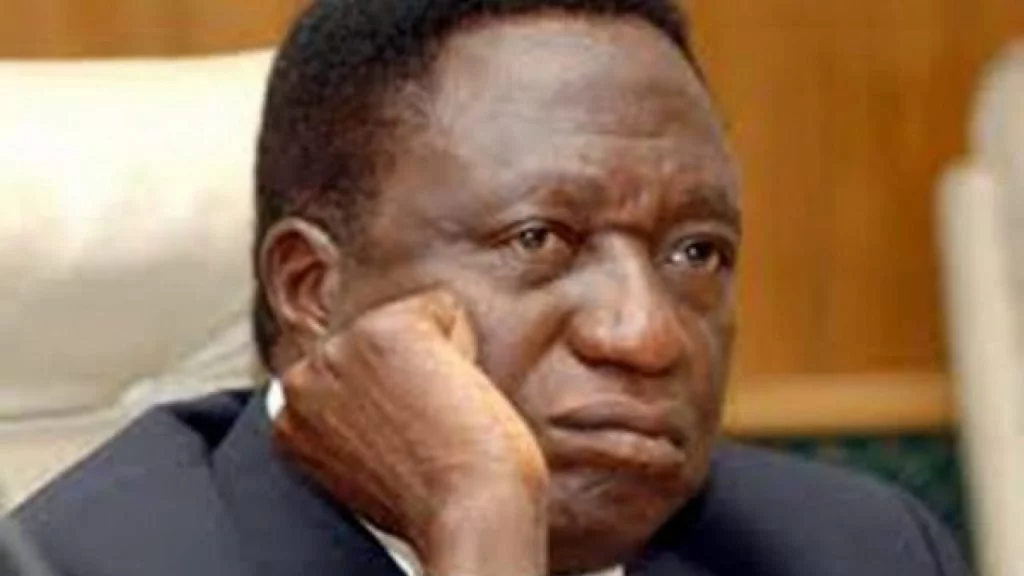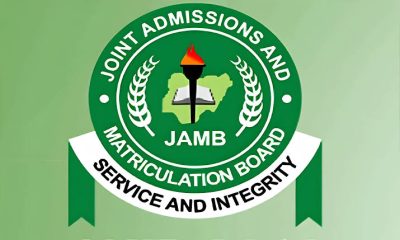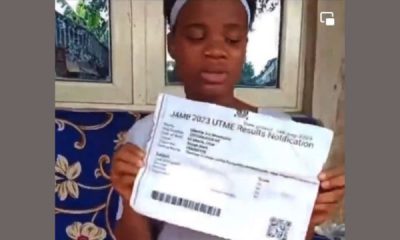Headline
Dibu Ojerinde, Sons, Daughter-In-Law Docked

The Federal Government on Thursday in Abuja put Professor Lawrence Adedibu Ojerinde, his three sons, and a daughter-in-law on trial for allegedly disposing of the property of the Joint Admission and Matriculation Board (JAMB) in Ghana.
The accused, who were all present in court, were docked on 17-count criminal charges by the Independent Corrupt Practices and Other Related Offences Commission (ICPC).
Prof Ojerinde, already arraigned twice, was docked for the third time alongside his family’s six companies.
In the new charge, the former JAMB registrar is accused of selling off a Federal Government property situated at House No. 4, Ahomko Drive, Achimota Phase Two, Accra, Ghana.
The house was said to have been sold by Ojerinde and his sons after it was forfeited to the federal government.
The fresh charge indicated that the alleged corrupt benefit conferred on Ojerinde by one Jimoh Olabisi Olatunde while he was a public officer contravened Section 26 (1) (c) and is punishable under Section 24 of the ICPC Act 2000.
Arraigned alongside Ojerinde were his three sons, Olumide Abiodun Ojerinde, Adedayo Ojerinde, and Oluwaseun Adeniyi Ojerinde, as well as his daughter-in-law, Mary Funmilola Ojerinde.
The family’s companies also put on trial were Doyin Ogbohi Petroleum Ltd, Cheng Marbles Limited, Sapati International Schools Ltd, Trillium Learning Centres Ltd, Standout Institutes Ltd and ESLI Perfect Security Printers Ltd.
Apart from the alleged unlawful sale of Federal Government property in Ghana, the former JAMB registrar was accused of using fake names to acquire companies, open bank accounts, acquire petroleum stations, and buy landed properties in Ilorin, Kwara State, while he was a public officer.
The charges also indicated that his sons acted as agents to facilitate the alleged sale of the house in Ghana.
The defendants all pleaded not guilty to the charges.
Due to their repeated refusals to accept invitations from the anti-graft agency and the likelihood that additional charges will be brought against them, ICPC lawyer Ebenezer Adenekan Shogunle opposed the granting of bail to Ojerinde and Oluwaseun Adeniyi Ojerinde.
Justice Inyang Edem Ekwo, who took the plea of the defendants, asked the ICPC lawyer if there were pending criminal charges against them and if they were admitted on bail by the courts, to which the counsel answered in the affirmative.
The ICPC lawyer acknowledged that Ojerinde was going through a similar trial before the Federal High Court in Abuja and the Niger State High Court in Minna.
Justice Ekwo invoked the prior bail conditions to admit the former JAMB Registrar to bail after it was established that another Federal High Court in Abuja had previously granted bail to the individual.
The judge, however, admitted his three sons and daughter-in-law on bail in the sum of N20 million and for each of them one surety in like sum who must be property owners in Abuja with verified proofs of ownership.
The original title documents for the properties were to be deposited with the court, the judge ruled. The defendants were instructed to leave their passports in the custody of the court registrar and were prohibited from leaving the country without the court’s permission.
Justice Ekwo instructed Ojerinde, who was openly crying, to get immediate medical attention for his deteriorating health so that he could stand for trial as required by law.
The court subsequently fixed November 13, 14, 15, and 16 for trial, during which the ICPC is expected to call 18 witnesses to testify against the defendants.
Headline
EFCC bars dollar transactions, orders embassies to charge in naira

The Economic and Financial Crimes Commission has barred foreign missions based in Nigeria from transacting in foreign currencies and mandated them to use Naira in their financial businesses.
The EFCC has also mandated Nigerian foreign missions domiciled abroad to accept Naira in their financial businesses.
The anti-graft agency said the move is to tackle the dollarisation of the Nigerian economy and the degradation of the naira
The Commission, therefore, asked the government to stop foreign missions in Nigeria from charging visa and other consular services in foreign denominations.
The EFCC gave the advisory in a letter to the Minister of Foreign Affairs, Amb. Yusuf Tuggar, for onward transmission to all foreign missions in the country.
In the letter, the EFCC said it issued the advisory because the practice of paying for consular services in dollars was in conflict with extant laws and financial regulations in Nigeria.
In a letter dated April 5, 2024, which was addressed to the Minister of Foreign Affairs, Ambassador Yusuf Tuggar, titled: “EFCC Advisory to Foreign Missions against Invoicing in US Dollar,” the EFCC Chairman, Ola Olukoyede expressed dismay over the invoicing of consular services in Nigeria by foreign missions in dollars.
The EFCC cited Section 20(1) of the Central Bank of Nigeria Act, 2007, which makes currencies issued by the apex bank the only legal tender in Nigeria.
The letter read, “I present to you the compliments of the Economic and Financial Crimes Commission, and wish to notify you about the commission’s observation, with dismay, regarding the unhealthy practice by some foreign missions to invoice consular services to Nigerians and other foreign nationals in the country in United States dollar ($).
“It states that ‘the currency notes issued by the Bank shall be the legal tender in Nigeria on their face value for the payment of any amount’.
“This presupposes that any transaction in currencies other than the naira anywhere in Nigeria contravenes the law and is, therefore, illegal.”
The commission further stated that the rejection of the naira for consular services in Nigeria by certain missions, along with non-compliance with foreign exchange regulations in determining service costs, is not just unlawful but also undermines the nation’s sovereignty embodied in its official currency.
The letter continues: “This trend can no longer be tolerated, especially in a volatile economic environment where the country’s macroeconomic policies are constantly under attack by all manner of state and non-state actors.
“In light of the above, you may wish to convey the commission’s displeasure to all missions in Nigeria and restate Nigeria’s desire for their operations not to conflict with extant laws and regulations in the country.”
Diplomatic sources said yesterday, May 10, that some embassies were wondering whether the EFCC’s advisory represented the position of the Federal Government.
Headline
Prince Harry visits sick Nigerian soldiers in Kaduna

Prince Harry and his team visited the 44 Nigerian Army Reference Hospital in Kaduna to interact with wounded soldiers who are receiving treatment.
The Duke of Sussex is in Nigeria with his wife to champion the Invictus Games, which Harry founded to aid the rehabilitation of wounded and sick servicemembers and veterans.
Nigeria joined the Invictus Community of Nations in 2022 becoming the first African country to join.
Prince Harry’s visit to Kaduna came 68 years after his late grandmother Queen Elizabeth II visited the state during the time of the late Premier of Northern Region Sir Ahmadu Bello.




-

 Headline2 days ago
Headline2 days agoSuspend cybersecurity levy– Reps to CBN
-

 Headline2 days ago
Headline2 days agoTinubu resumes work after foreign trip
-

 Business2 days ago
Business2 days agoNigeria needs over $2bn to revive Ajaokuta Steel Plant, says Minister
-

 News2 days ago
News2 days agoShan George’s money returned to Zenith Bank account
-

 Entertainment3 hours ago
Entertainment3 hours agoAMVCA Cultural Day: BBNaija’s Neo, Venita win Best Dressed Male, Female
-

 Metro3 hours ago
Metro3 hours agoEx-Sports Minister laments after hospital neglected him for hours over N80000 deposit
-

 Headline3 hours ago
Headline3 hours agoPrince Harry visits sick Nigerian soldiers in Kaduna









